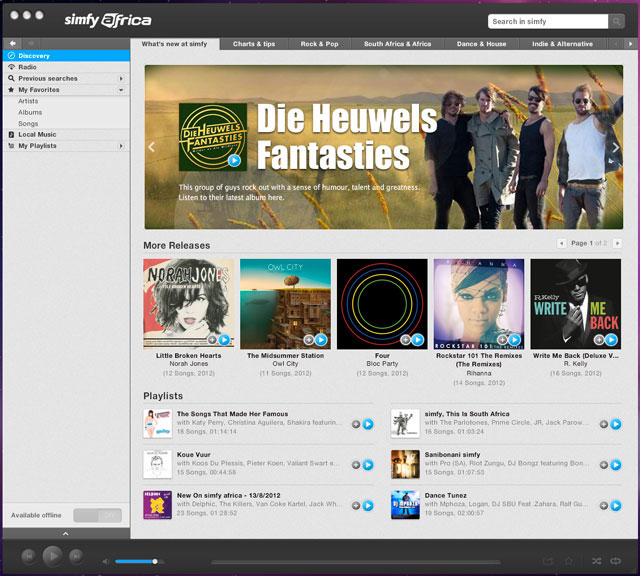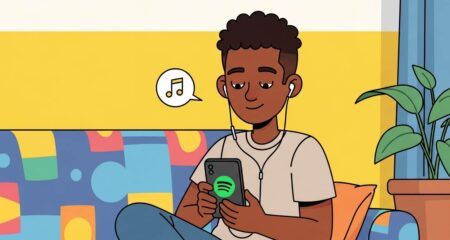
With more than 16m tracks, 2m albums and 650 000 artists, Simfy is a fully fledged music streaming service that stacks up incredibly well against rivals Spotify, Rhapsody and Rdio. From next week it’s available in SA – without the need for a foreign credit card, a virtual private network, or any of the other digital trickery that’s been necessary until now to use these sorts of services.
Started in Cologne in Germany, the Simfy is available in Austria, Belgium and Switzerland. It’s now being launched in SA in partnership with Primedia-owned mobile content company eXactmobile.
Having made its fortune selling ringtones, wallpapers and, for a time, digital music, eXactmobile has extensive relationships with local record labels which explains the superb selection of local content already available through Simfy.
Simfy Africa chief technology officer Richard Cimardi says SA presents unique challenges for a service like Simfy. There have been lengthy talks with Simfy in German to ensure the SA version is designed with its target market in mind rather than simply mimicking the European versions of the service.
As its name suggests, Simfy’s interface is simple to use and Cimardi says this was one of the key reasons eXactmobile opted to partner with Simfy rather than one of its rivals. All of the core functionality is accessible from inside a Web browser, with the exception of offline mode where users can download MP3 audio files to a desktop, laptop or mobile device so that they can consume audio without a data connection and without incurring additional bandwidth costs.
The Web version of the service also includes its own social network where users can add other users as friends and share listening history and playlists. Users can also limit what information is displayed on their profile or with whom it is shared.
Like the bulk of its rivals, Simfy integrates with Last.fm and its “audioscrobbler” feature that tracks what users listen to. It also allows users to link their Simfy accounts to Facebook or Twitter so they can share album, artist or song recommendations. In the case of Facebook, they can also let Simfy track their listening history.
Simfy offers a feature called “Radio” which works in a similar way to the “Genius” feature in Apple’s iTunes. It creates playlists for users based on a specific artist or genre. Though the service has yet to harness the music discovery possibilities afforded by integration with Last.fm and Facebook fully, this is a step in the right direction.
Mobile music
At launch, Simfy Africa will also be available using mobile applications for Android, BlackBerry and iOS. Ryan Birkin, Simfy Africa’s chief business development officer, says these were viewed as the most important platforms for the SA market and that Simfy Africa had to pressure its German parent to prioritise support for BlackBerry.

He says an app, or apps, for Nokia devices will follow, but can’t confirm when this will happen. “Nokia is definitely on our strategic roadmap,” says Birkin.
Although there is a beta application of an iPad app for Simfy’s German offering, this isn’t yet available to SA users. Cimardi says the iPad app is being overhauled and will be launched in SA in coming months. He says the iPhone app is also being “revamped”.
Simfy customers can use the service on multiple computers and devices, but offline functionality is limited to three pieces of hardware. Users can change their list of devices twice in a six-month period.
Offline storage works only with playlists and not the items in the “my favourites” section of the desktop and mobile interfaces. Once a user has chosen to make a playlist available offline, any further additions to the playlist will also be added the next time the app is used. Offline storage is limited only by the amount of space on the device in question. In theory, users could download terabytes of songs.
In order to get record labels, particularly local ones, to agree to the offline functionality, Cimardi says Simfy had to demonstrate that users would not be able to share offline tracks. He says tracks stored offline are tied to an encrypted database that links them to the device on which they’re stored.
“The tracks are downloaded in MP3 format and linked to the actual device, so even if you could get them off the device without the database tie-in, they won’t play on other devices,” Cimardi says.
Whether online or offline, all tracks on Simfy Africa are encoded at 192kbit/s, which Birkin says translates to approximately 85MB/hour when streaming. “Although a 512kbit/s fixed line or 3G mobile data are recommended, Simfy works well over a 384kbit/s connection.”
In future, Simfy may offer users the option of choosing different bit rates, but it settled on 192kbit/s at launch because it represents a good balance of audio quality without requiring fat broadband pipes.
Cheque, please
All new users will get a two-week trial of Simfy before they’re required to cough up the R60/month should they wish to continue using the service. At launch, they will be able to pay by credit card or electronic funds transfer, or using their mobile airtime.

Strangely, there’s no discount for signing up for more than a month at a time. Whether someone signs up for month, a quarter or a year, the subscription still costs R60/month. Birkin says the company does intend making its longer-term offerings “more aggressive” and that discounts are being finalised and will be available when the service launches next week.
The benefit of this approach, however, is that consumers aren’t required to commit to lengthy contracts and can cancel at any time. “There’s no notice period required,” says Birkin. “If you don’t pay, it just stops working.”
Simfy isn’t aiming at the youth market alone. Apart from pop, rock and hip-hop, the service also offers a wide range of jazz, classical, opera and “golden oldies”.
Like its competitors, Simfy is also able to upload music stored locally on users’ computers, so those with large collections of obscure tracks can integrate them into the service and create playlists using media they already own. It’s also possible to import an iTunes library into Simfy.
What it can’t do is compare its library to a user’s existing library. Nor is it possible to get locally stored tracks onto mobile devices. Cimardi says this is due to both licensing challenges and the problems of metadata. In order to do that sort of comparison, metadata from Simfy’s database needs to correspond to those of users’ tracks and that this can prove difficult where content has been ripped from CD or downloaded and is poorly tagged.
Simfy users are encouraged to put in requests for missing albums or other content and to offer suggestions using the feedback tab on the website. “We definitely want requests,” says Birkin. “A lot of what we do in future is going to be based on user demand.”
Money for nothing?
Simfy is coy about the payment structure for artists, with neither Birkin nor Cimardi prepared to go into detail.
The model is “constructive” but “confidential”, Birkin offers. “We’re happy that this is a fair way for SA artists to make money.”
The basics are clear: artists who get played the most get paid the most.
Like its rivals, Simfy isn’t perfect. Despite offering more than 16m tracks, there are big gaps in its repertoire. Some artists are well represented with all-encompassing discographies; others are selectively represented; and some artists one might expect to find aren’t there at all.
In some instances, an artist’s early albums are included but their later work, which followed a change of record label, is missing. Other times artists have been with a label their entire careers but only some of their output is available.

It’s difficult to come up with a rule of thumb for what is or isn’t included, but on the whole the selection is excellent.
Fans of the arcane and obscure probably won’t find Simfy sufficiently well stocked for their tastes, but there is the ability to include local media and the database is set to grow. Simfy says it intends to add thousands of tracks every month, both old and new. Moreover, with a 14-day trial period it’s easy enough to check before handing over any cash.
Simfy Africa isn’t half-baked or a second-rate streaming service aimed at a market that doesn’t know any better. It’s got big backing, big plans and a big catalogue. Without a local iTunes music store — or any local competitors that can rival the range of music on offer — it’s hard to see how it could fail.
Streaming has arrived in SA. It’s time to dust off your headphones. — (c) 2012 NewsCentral Media
- Image: Flickr/Messent




